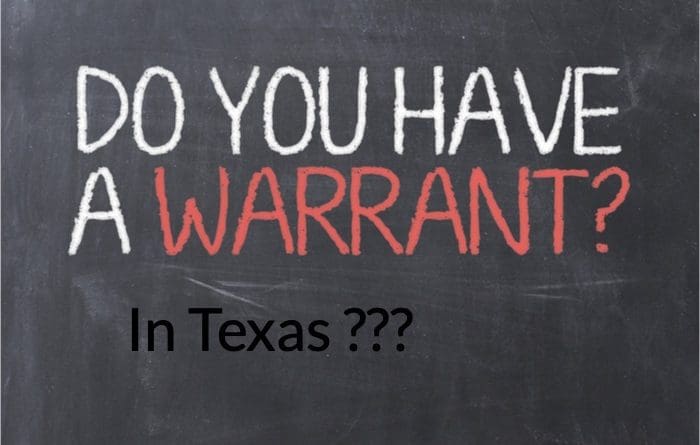Navigating traffic warrants in Texas can be a challenging and stressful experience. A traffic warrant is a legal document issued by a court that orders law enforcement to arrest an individual who has failed to pay a traffic ticket or has violated the terms of their probation.

Image: tex.org
If you have received a traffic warrant in Texas, it is important to take immediate action to resolve it. Failure to do so can result in serious consequences, including arrest, jail time, and hefty fines. In this comprehensive guide, we will explore the steps involved in getting rid of traffic warrants in Texas and provide expert advice to help you navigate the process effectively.
Understanding Traffic Warrants in Texas
Definition and History
A traffic warrant is a legal document issued by a court that authorizes law enforcement to arrest an individual for failing to pay a traffic ticket or violating the terms of their probation. In Texas, traffic warrants are typically issued for minor offenses, such as speeding, running a red light, or driving without a license. However, even minor traffic offenses can lead to serious consequences if they are not resolved promptly.
The history of traffic warrants in Texas dates back to the early 1900s when the state first began issuing warrants for unpaid traffic tickets. Over the years, the use of traffic warrants has become increasingly common as a means of enforcing traffic laws and ensuring that offenders are held accountable for their actions.
Meaning and Significance
Traffic warrants have a significant impact on individuals who receive them. A warrant can result in arrest, which can lead to jail time, fines, and other penalties. In addition, a warrant can also make it difficult to obtain employment, housing, and other essential services. Therefore, it is important to take immediate action to resolve a traffic warrant if you have received one.

Image: www.reddit.com
Navigating the Process: Step-by-Step Guide
1. Determine the Type of Warrant
The first step in getting rid of a traffic warrant is to determine the type of warrant you have. There are two main types of traffic warrants in Texas: capias and alias capias.
- Capias Warrant: This type of warrant is issued when an individual fails to appear for a scheduled court date or violates the terms of their probation.
- Alias Capias Warrant: This type of warrant is issued when an individual has failed to comply with a capias warrant.
It is important to determine the type of warrant you have, as this will affect the steps you need to take to resolve it.
2. Contact the Court
Once you have determined the type of warrant you have, you should contact the court that issued the warrant. The court will be able to provide you with information about the status of your warrant and the steps you need to take to resolve it.
When you contact the court, be prepared to provide the following information:
- Your name
- Your date of birth
- The case number
- The type of warrant you have
3. Pay the Fines and Fees
In most cases, you will need to pay the fines and fees associated with your traffic ticket in order to resolve your warrant. The court will be able to provide you with a payment plan if you are unable to pay the full amount upfront.
Once you have paid the fines and fees, the court will issue a “satisfaction of judgment.” This document will release the warrant and allow you to clear your record.
4. Appear in Court
If you have a capias warrant, you will need to appear in court on the date specified in the warrant. If you fail to appear in court, the warrant will remain active and you may be arrested.
When you appear in court, you will have the opportunity to explain why you failed to appear for your scheduled court date. The judge will then decide whether to release the warrant or issue an alias capias warrant.
5. Seek Legal Advice
If you are facing a traffic warrant, it is advisable to seek legal advice from an experienced attorney. An attorney can help you understand your rights, negotiate with the court, and develop a strategy for resolving your warrant.
Seeking legal advice can increase your chances of getting your warrant lifted and avoiding the negative consequences of arrest and jail time.
Expert Advice for Getting Rid of Traffic Warrants
1. Act Quickly
If you have received a traffic warrant, it is important to take action as soon as possible. The longer you wait to resolve the warrant, the more likely it is that you will be arrested.
2. Be Honest with the Court
When you appear in court, be honest with the judge about why you failed to appear for your scheduled court date or violated the terms of your probation. The judge is more likely to be lenient if you are upfront and honest about your situation.
3. Take Responsibility
Take responsibility for your actions and be willing to pay the fines and fees associated with your traffic ticket. The court is more likely to work with you if you are willing to take responsibility for your mistake.
4. Seek Support
If you are struggling to resolve your traffic warrant, there are resources available to help you. You can contact a legal aid organization or a community service agency for assistance.
5. Don’t Be Afraid to Negotiate
In some cases, you may be able to negotiate with the court to reduce the fines and fees associated with your traffic ticket. You can also request a payment plan if you are unable to pay the full amount upfront.
Frequently Asked Questions (FAQs)
- What happens if I am arrested on a traffic warrant?
If you are arrested on a traffic warrant, you will be taken to jail and held until you can post bail or pay the fines and fees associated with your ticket.
- Can I get my traffic warrant dismissed?
In some cases, you may be able to get your traffic warrant dismissed if you can prove that you had a good reason for missing your court date or violating the terms of your probation.
- How long does a traffic warrant stay active?
A traffic warrant stays active until it is resolved. This means that you could be arrested on a warrant even years after it was issued.
- What should I do if I have a traffic warrant from another state?
If you have a traffic warrant from another state, you should contact the court that issued the warrant to find out how to resolve it.
- Can I get a driver’s license with a traffic warrant?
In most cases, you will not be able to get a driver’s license if you have an active traffic warrant.
How To Get Rid Of Traffic Warrants In Texas
Conclusion
Getting rid of traffic warrants in Texas can be a challenging and stressful experience, but it is important to take action as soon as possible. By following the steps outlined in this guide and seeking professional advice if necessary, you can increase your chances of successfully resolving your warrant and avoiding the negative consequences of arrest and jail time.
If you have any questions or concerns about traffic warrants in Texas, please do not hesitate to contact an experienced attorney or visit the website of the Texas Department of Public Safety for more information.